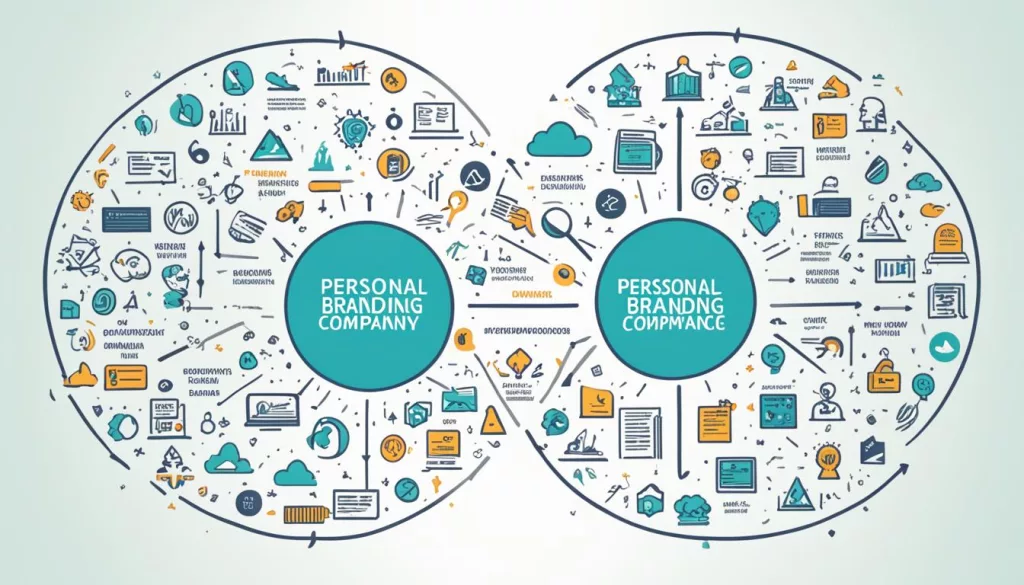In today’s competitive world, it’s not enough to just have a great product or service. You need to distinguish yourself from the competition and establish a strong presence in your industry. That’s where branding comes in. But when it comes to branding, should you focus on personal branding or company branding?
While both personal branding and company branding have their merits, personal branding offers unique advantages that can help you stand out and achieve success faster. By focusing on building your personal brand, you can create a powerful identity that resonates with your target audience and sets you apart from your competitors.
So, why should you stop branding your company and start branding yourself? Let’s dive deeper into the importance of personal branding and the strategies you can use to boost your identity.
Key Takeaways:
- Personal branding is the process of creating a brand identity for yourself or your business.
- Personal branding helps you stand out, leads to new opportunities, builds trust, and controls your online narrative.
- There are several benefits of personal branding, including standing out in a competitive job market and commanding a higher salary.
- To develop your personal brand, clean up your social media, define your target audience, create valuable content, and maintain consistency across platforms.
- Integrating your personal and business brands can lead to greater success and goal achievement.
What Is Personal Branding and Why Is It Important?
Personal branding is the process of creating a brand identity for yourself or your business. It involves defining your values, mission, and personality to project it to the world. Personal branding is important because it helps you stand out from the competition, leads to new opportunities, builds trust with your audience, and helps you control your online reputation.
By developing a personal brand, you create a distinct image that sets you apart from others in your industry. This image reflects your unique skills, experiences, and expertise, allowing you to showcase your value proposition effectively.
Your personal brand acts as your professional identity and establishes your credibility in your field. It helps you build a strong reputation and boosts your visibility, making it easier for employers, clients, and partners to find and trust you.
In an increasingly digital world, personal branding is crucial for managing your online presence. It allows you to shape the narrative about yourself and control how others perceive you. With a well-crafted personal brand, you can curate your online image to align with your professional goals.
The Definition of Personal Branding
“Personal branding is the intentional process of developing and promoting your unique professional identity.”
Creating a personal brand is not just about self-promotion; it’s about crafting a genuine and authentic representation of who you are. It involves understanding your strengths, values, and passions and communicating them effectively to your target audience.
Your personal brand is a strategic tool that helps you differentiate yourself from others and position yourself as an expert in your field. It allows you to build meaningful connections and establish yourself as a thought leader.
Why Is Personal Branding Important?
Personal branding offers several benefits that can accelerate your professional growth:
- Stand out from the competition: In today’s crowded marketplace, personal branding helps you differentiate yourself from others with similar qualifications and expertise. It allows you to showcase your unique strengths and skills, making you more memorable to potential clients, employers, and partners.
- Open doors to new opportunities: A strong personal brand attracts new opportunities. By positioning yourself as an expert in your field, you increase your chances of being sought after for speaking engagements, collaborations, and career advancements.
- Build trust with your audience: Personal branding establishes trust and credibility with your target audience. By consistently delivering value and demonstrating your expertise, you build a loyal following that trusts your opinions and recommendations.
- Control your online reputation: With a well-developed personal brand, you have more control over how you are perceived online. By actively managing your online presence, you can highlight your achievements, showcase your expertise, and address any potential inconsistencies or misconceptions.
Investing in personal branding is an investment in your professional success. It allows you to shape your narrative, build your reputation, and create valuable opportunities. Embrace the power of personal branding and unlock your true potential.
The Benefits of Personal Branding
Personal branding offers numerous advantages that can significantly impact your career and online presence. By developing a strong personal brand, you can stand out from the crowd, enhance your professional reputation, and seize exciting opportunities.
Stand Out From the Crowd
Personal branding enables you to differentiate yourself in a competitive job market. When employers are inundated with countless applicants, a strong personal brand sets you apart and captures their attention. It showcases your unique skills, experiences, and attributes that make you the ideal candidate.
Personal Branding and Career
Your personal brand can propel your career to new heights. By building a consistent and compelling brand image, you create a reputation that precedes you. This can lead to career advancements, promotions, and increased earning potential. With a well-established personal brand, you become sought after in your industry and are presented with exciting opportunities.
Trust and Personal Branding
Building trust is crucial in any professional relationship. A strong personal brand fosters trust among your audience, clients, and colleagues. When your brand consistently delivers on its promises and aligns with your audience’s values, it establishes a sense of credibility and reliability, making others more inclined to engage with you.
Personal Branding and Online Presence
In today’s digital age, your online presence is paramount. Personal branding allows you to shape and control your online reputation. By strategically positioning yourself on various platforms, you can curate content and portray yourself in a positive light. This not only helps you attract the right opportunities but also safeguards your brand from potential reputational risks.

| Benefits of Personal Branding | Description |
|---|---|
| Stand Out From the Crowd | Personal branding helps you differentiate yourself in a competitive job market. |
| Enhanced Career Growth | A well-established personal brand can lead to exciting career advancements and increased earning potential. |
| Building Trust | A strong personal brand fosters trust among your audience, clients, and colleagues. |
| Controlled Online Presence | Personal branding allows you to shape and control your online reputation, safeguarding your brand from potential reputational risks. |
How to Develop Your Personal Brand
To develop a strong personal brand, it is essential to follow strategic steps that will help you stand out from the crowd and establish your unique identity. By implementing effective personal branding strategies, you can build a powerful and influential personal brand that resonates with your target audience. Here are some tips and techniques to help you develop your personal brand:
Clean Up Your Social Media Accounts
Start by cleaning up your social media presence. Remove any posts, images, or comments that may be inconsistent with your desired personal brand image. Ensure that your social media profiles reflect your values, mission, and professional interests.
Create a Personal Website
Building a personal website is crucial for showcasing your skills, expertise, and achievements. Use your website to share your portfolio, blog about your industry insights, and provide valuable resources to your audience. Make sure your website design is visually appealing and user-friendly.
Define Your Target Audience
Identify your target audience and understand their needs, preferences, and pain points. This knowledge will help you create personalized content that adds value to their lives and establishes you as an authority in your field.
Create a Content Strategy
Develop a content strategy that aligns with your personal brand values and goals. Consistently publish high-quality and engaging content that showcases your expertise, shares industry insights, and provides solutions to your audience’s challenges.
Build Your Email List
Consider offering specialized, personal content to your audience in exchange for their email addresses. Building an email list allows you to cultivate a direct line of communication with your audience and nurture deeper relationships.
Create a Consistent Visual Identity
Choose a consistent logo, color scheme, and overall theme that represents your personal brand. Use these visual elements across all your social media platforms, website, and any other branding materials to create a cohesive and memorable brand identity.
Define Your Values and Mission
Clearly define your values, mission, and goals to shape your brand identity. Establish what you stand for and communicate it consistently through your content, interactions, and brand messaging. This will allow your audience to connect with your authentic self and differentiate you from others in your industry.
By following these personal branding tips and strategies, you can develop a compelling personal brand that resonates with your target audience, builds trust, and opens doors to new opportunities.
Personal Branding vs. Company Branding
When it comes to establishing a strong brand identity, both personal branding and company branding play crucial roles. Personal branding focuses on creating a brand identity for yourself, while company branding is all about creating a brand identity for your business. Each approach has its own benefits and strategies that can contribute to your overall success.
Personal Branding and Business Success:
Personal branding can significantly enhance your business success. By building a strong personal brand, you can establish trust and loyalty with your audience, which can ultimately translate into better business outcomes. When people trust and relate to you as an individual, they are more likely to engage with your business and become loyal customers.
Company Branding Strategies:
To effectively brand your company, you need to develop consistent branding strategies that align with your business goals and values. Company branding involves creating a unique identity for your business that sets it apart from competitors. This includes designing a compelling logo, using consistent visual elements, and crafting a brand message that resonates with your target audience.
While personal branding and company branding have their unique focuses, it is important to integrate both to achieve a powerful branding combination. By aligning your personal brand with your business brand, you can amplify your reach and influence, making it easier to achieve your goals.
Table:
| Personal Branding | Company Branding |
|---|---|
| Focuses on creating a brand identity for yourself | Focuses on creating a brand identity for a business |
| Builds trust and loyalty with your audience | Establishes a unique identity for your business |
| Drives personal success and enhances business outcomes | Sets your business apart from competitors |
| Integration with personal and business brand amplifies reach | Aligns branding strategy with business goals |
The key to successful branding lies in finding the right balance between personal branding and company branding. By leveraging the unique strengths of both approaches, you can create a compelling and authentic brand identity that resonates with your audience, boosts your business success, and sets you apart from the competition.

So, whether you are an entrepreneur, business professional, or freelancer, investing in personal branding alongside your company branding can lead to a more powerful and impactful brand presence. Remember, your personal brand is an asset that can help you stand out in an increasingly competitive market.
Tips for Successful Personal Branding
Building a successful personal brand takes effort and consistency. To ensure that your personal brand stands out and resonates with your audience, follow these best practices:
- Have a clear message: Define your unique value proposition and communicate it clearly. Determine what sets you apart from others in your field and highlight those qualities.
- Stay consistent: Ensure that your personal brand is consistent across all platforms. Use the same tone, style, and visuals to create a cohesive identity.
- Be genuine and authentic: Share your true self and tell your own story. People appreciate authenticity and are more likely to connect with a brand that feels genuine.
- Engage with your audience: Interact with your followers, respond to comments and messages, and actively engage in conversations. This helps build trust and a loyal community around your personal brand.
- Embrace failure: Failure is a natural part of the branding process. Learn from your mistakes, adapt, and keep moving forward. Embracing failure shows resilience and growth.
- Build a positive impact: Use your personal brand to make a difference in the lives of others. Provide value through your content, offer support and guidance, and contribute positively to your community.
- Leave a legacy: Aim to create a lasting impact with your personal brand. Leave a positive mark on your industry, inspire others, and be remembered for your contributions.
- Learn from successful examples: Study successful personal brands in your field and learn from their strategies. Adapt their techniques to fit your own brand and find inspiration for your personal branding journey.
Conclusion
Personal branding is a powerful tool that can take your professional success to new heights. Instead of solely focusing on company branding, it’s time to shift your attention to personal branding. By creating a strong brand identity for yourself, you can set yourself apart from the competition and establish a unique presence in your industry.
Integrating your personal brand with your business brand can be a game-changer. It allows you to leverage your personal strengths and values to drive the success of your company. By aligning your personal and business brands, you can achieve your goals more efficiently and effectively.
Embracing the tips and techniques for successful personal branding is essential to unlocking the full potential of your brand. Stay consistent with your values, be authentic, and engage with your audience. Learn from both successes and failures to grow and improve.
So, it’s time to stop solely focusing on branding your company. Start investing in yourself and building your personal brand. By doing so, you’ll position yourself as a standout professional and open doors to endless opportunities for growth and achievement.
FAQ
What is personal branding?
Personal branding is the process of creating a brand identity for yourself or your business. It involves defining your values, mission, and personality to project it to the world.
Why is personal branding important?
Personal branding is important because it helps you stand out from the competition, leads to new opportunities, builds trust with your audience, and helps you control your online reputation.
What are the benefits of personal branding?
Personal branding offers several benefits, such as helping you stand out in a competitive job market and commanding a higher salary. It can lead to new opportunities and collaborations, as well as build trust with your audience. Personal branding also helps you control your online presence and build a strong reputation that sets you apart from others.
How can I develop my personal brand?
To develop your personal brand, start by cleaning up your social media accounts and creating a personal website. Define your target audience and create a content strategy that adds value to their lives. Publish compelling content and consider providing specialized, personal content to build your email list. Create a consistent logo and theme for yourself and keep it consistent across all your social media platforms. Define your values and mission to shape your brand identity.
What is the difference between personal branding and company branding?
Personal branding focuses on creating a brand identity for yourself, while company branding is about creating a brand identity for a business. Personal branding can enhance your business success by building trust and loyalty with your audience. It is important to integrate your personal and business brands to have a powerful branding combination that helps you reach your goals faster and easier.
What are some tips for successful personal branding?
To have successful personal branding, focus on having a clear message and staying consistent with your values. Be genuine and authentic, telling your own story and engaging with your audience. Be ready to embrace failure and learn from it, as it is a crucial part of the branding process. Build a positive impact and help others, leaving a legacy through your brand. Follow successful examples and learn from them to enhance your personal brand.
What is the conclusion about personal branding?
Personal branding is a powerful tool that can elevate your professional success. By shifting your focus from company branding to personal branding, you can create a strong brand identity that sets you apart from the competition. Integrating your personal and business brands can lead to faster and easier goal achievement. Embrace the tips and techniques for successful personal branding to unlock the full potential of your brand. So, stop branding your company and start branding yourself.





